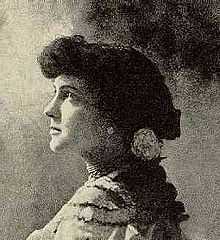Delmira Agustini
| Delmira Agustini | |
|---|---|
 | |
| Born |
October 24, 1886 |
| Died |
July 6, 1914 (aged 27) |
| Occupation | poet, writer |
| Nationality | Uruguayan |
| Period | Modernist |
| Spouse(s) | Enrique Job Reyes |
Delmira Agustini (October 24, 1886 – July 6, 1914), a Uruguayan poet, is considered one of the greatest female Latin American poets of the early 20th century.
Background
Born in Montevideo, the daughter of Italian immigrants, Agustini was a precocious child. In addition to beginning to write poetry when she was 10 years old, she studied French, music and painting.
Writing career
She wrote for the magazine La Alborada (The Dawn). She formed part of the Generation of 1900, along with Julio Herrera y Reissig, Leopoldo Lugones and Rubén Darío, whom she considered her teacher. Darío compared Agustini to Teresa of Ávila, stating that Agustini was the only woman writer since the saint to express herself as a woman.
She specialized in the topic of female sexuality during a time when the literary world was dominated by men. Agustini's writing style is best classified in the first phase of modernism, with themes based on fantasy and exotic subjects.
Eros, god of love, symbolizes eroticism and is the inspiration to Agustini's poems about carnal pleasures. Eros is the protagonist in many of Agustini's literary works. She even dedicated her third book to him titled Los Cálices Vacíos (Empty Chalices) in 1913, which was acclaimed as her entrance into to a new literary movement, "La Vanguardia" (The Vanguard).
Agustini was blue eyed, with light skin and a slender figure. Some might have testified that she looked like an innocent angel. The daughter of a distinguished family, Agustini had all that she needed and was at the same time indulged. This unconditional and overbearing love led her to themes of submission and charm as well as spiritualized erotic imagery.
Personal life and death
She married Enrique Job Reyes on August 14, 1913 but left him a month later. Their divorce was finalized on June 5, 1914. A month after that, Reyes fatally shot Agustini twice in the head and afterwards committed suicide. She died in their house in Montevideo, Uruguay.
She is buried in the Central Cemetery of Montevideo.
Bibliography
Each year links to its corresponding "[year] in poetry" article:
- 1907: El libro blanco[1]
- 1910: Cantos de la mañana[1]
- 1913: Los cálices vacíos, pórtico de Rubén Darío[1]
- 1924: Obras completas ("Complete Works"): Volume 1, El rosario de Eros; Volume 2: Los astros del abismo, posthumously published (died 1914), Montevideo, Uruguay: Máximo García[1]
- 1944: Poesías, prologue by Luisa Luisi (Motevideo, Claudio García & Co.[1]
- 1971: Poesías completas, prólogue and notes by Manuel Alvar, Barcelona: Editorial Labor[1]
Notes
External links
| |
|---|
| |
| |
| Works at Cervantes Virtual |
- Modernization, Feminism, and Delmira Agustini
- The Empty Chalices by Judy Veramendi, a novel and play based on the life and writings of Delmira Agustini
|
.